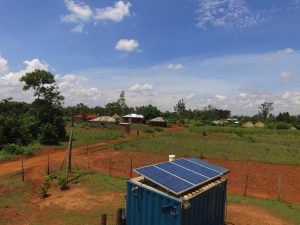Want to make money while helping to solve energy poverty?
The crowdfunding craze popularized by Kickstarter, IndieGoGo and Kiva allow individuals to invest a small amount of money in some big ideas. But can crowdfunding also be used to help people living in energy poverty?
Yes it can! Swedish-based startup TRINE connects people with a dispensable income to solar energy companies with the aim to help the 1.2 billion people currently without access to electricity.
Since being launched in 2016, the company has raised over €1.8 million towards 15 projects across Kenya, Tanzania, Uganda, Zambia and Senegal. More importantly, it has provided 170 000 people with access to electricity – resulting in around 50 000 tonnes in CO2 emissions.

Individuals can invest as little as €25 in a campaign, and expect a return on their investment once the companies begin their repayment. For example, the current campaign in Kenya earns investors a 5.1% expected annual return, and will enable energy access to over 6000 people.
The platform is open to large and small investors alike. Co-founder and CEO Sam Manaberi says the idea comes from his own experience of a shortage of opportunity for Europeans to invest sustainably. The aim is to connect people with disposable income to African entrepreneurs. "Currently in Africa, there are great entrepreneurs, a huge demand and proven technology to deliver these sorts of projects, but commercial finance is in short supply," Manaberi says.
TRINE aims to deliver a real win-win-win, a principle enshrined the name focusing on the triple-bottom-line. "It reflects and symbolizes our triple bottom line thinking, where our impact is threefold -- people, planet, profit," Manaberi says.
TRINE have been featured on CNN African-Startup and guested on BBC Business Live. They have also received attention from the likes of the WWF Climate Solver and COP 22, where they were invited to give a talk about the venture.
Some campaigns are supported by investment protection from UK Aid, such as the current one in Kenya, offering 50% first-loss protection, reducing the risk of the investment.
TRINE has global ambitions with plans to enable 66 million people with access to clean energy by 2022. For now, the platform is open to investors from countries in the European Economic Area, with more projects across Africa in the pipeline.

Global interest in crowd-investment is booming. In 2015, the market generated an estimated $2.1 billion globally for start-ups. The World Bank predicts it will skyrocket in developing countries over the next 10 years.Manaberi thinks these types of ventures like TRINE are well-suited for Africa. "Our model enables people to make a real impact, no matter who they are or what they do."
If you would like to invest in one of TRINE’s current projects, you can do so through their website here.